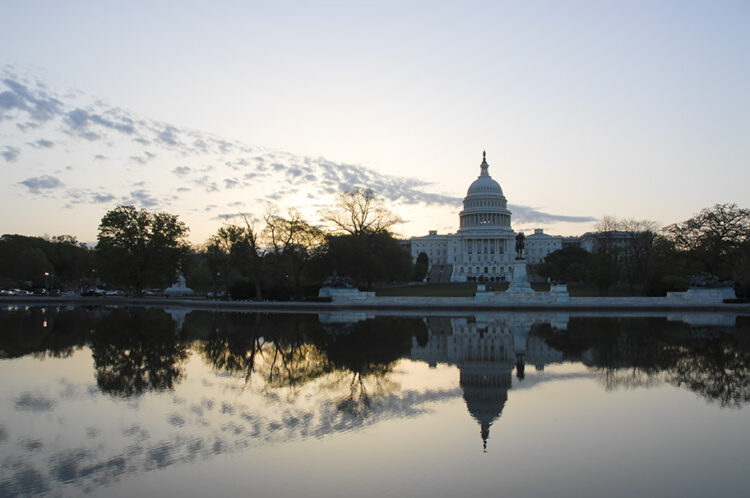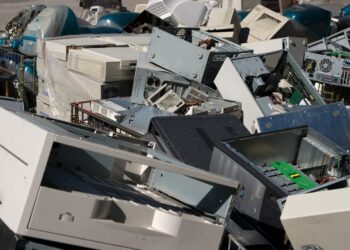Recycling issues have hit the national stage with unprecedented fervor in recent weeks. Citing recycling market challenges and growing plastic pollution, lawmakers are advancing legislation and pressuring government agencies to take action.
In two high-profile legislative moves this month, a waste reduction and recycling advancement bill was introduced in Congress and a separate proposal was announced that includes extended producer responsibility (EPR) for plastic packaging, a national bottle bill and more.
Meanwhile, dozens of members of Congress recently called on federal agencies to play a deeper role in enhancing the recycling system around the U.S.
It’s unclear whether these proposals will gain traction – a number of previous national policy efforts aimed at recycling improvements failed to advance. But some experts say progress has been made just by pushing materials recovery deeper into the political conversation.
“Just the fact that they’re having the discussion about this at a federal level is a good thing, because historically these issues have been handled at the state and local level,” said Steve Alexander, president and CEO of the Association of Plastic Recyclers (APR).
The activity comes amid a major market upheaval forcing changes in recycling programs across the country, as well as rising public concern over the environmental impacts of marine plastic pollution.
Querying federal agencies
The recent flurry of Congressional recycling activity got its start on July 12, when nearly four dozen lawmakers signed letters to the U.S. Department of Commerce and the U.S. EPA, querying the agencies on their activity related to national recycling challenges.
The effort was spearheaded by three U.S. House lawmakers, Reps. Haley Stevens, D-Mich., Mark Takano, D-Calif., and Deb Haaland, D-N.M.
“As the federal government flounders trying to find a solution to our nation’s recycling challenges, municipal leaders in my district and across the country are having to bear the burden,” Stevens said in a statement.
In a letter to Commerce Secretary Wilbur Ross, the lawmakers referenced China’s import restrictions and described the significant decrease in exports of recyclables to China over the past year-and-a-half. The letter points out that the Department of Commerce is mandated by the Resource Conservation and Recovery Act “to encourage greater commercialization of proven recycling technology as well as stimulate the development of markets for recycled materials in the United States.”
“Considering China’s ‘National Sword’ policy, we are troubled by the lack of mention of recycling as a priority for the Department of Commerce, which is equipped to respond to this growing threat,” the lawmakers wrote.
The letter asks the department to explain what actions it has taken to address the recycling challenges and to explain how the department is advancing the trade of recycled commodities as part of its trade promotion responsibilities.
A separate letter to U.S. EPA Administrator Andrew Wheeler asked similar questions of that agency.
“Since its inception EPA has recognized the importance and impact of recycling on American prosperity and environmental protection,” the letter reads. “Yet, despite EPA’s work to make recycling in the U.S. a mainstay, the nation’s capacity to recycle goods at the local level is vastly inadequate.”
The letter asks whether the EPA has developed a national strategy in response to China’s import restrictions, whether the agency is working with the Department of Commerce to create a more resilient recycling system, how the EPA is supporting recycling technology advancement, and more.
Congress “seeks assurances from the agency today that a national plan has been developed to manage this emerging crisis,” the letter reads.
The letter to the Department of Commerce was signed by 45 lawmakers in all, and the EPA letter received 47 signatures.
Zero Waste Act proposes $250M in funding
In their letter to the EPA, lawmakers said “targeted investments in local recycling programs to enhance recycling infrastructure” and technology is key to solving the current challenges. Legislation introduced last week establishes a framework to enable such investments.
Rep. Ilhan Omar, D-Minn., on July 25 introduced the Zero Waste Act, which creates federal grants to support municipalities in recycling and waste reduction efforts. The program would be carried out by the U.S. EPA and would be funded with up to $250 million from 2020 through 2027, according to the bill text.
The bill text indicates investments would focus on several key initiatives, including “creating demand for sorted recyclable commodities and refurbished goods and promoting domestically-owned and operated manufacturing for projects relating to source reduction of waste prevention.” Other areas of investment would include projects advancing source reduction, organics processing infrastructure and electronics reuse and recycling.
Shortly after the bill announcement, Omar hosted a discussion with the Global Alliance for Incinerator Alternatives (GAIA), which supports the bill. Omar expanded on the impetus behind the bill. She explained there are municipalities already advancing zero waste initiatives, including the city of Minneapolis, which is supporting the bill.
“But it seems like there is a problem sometimes in making it economically feasible to do so,” Omar said. “And so what our bill really does address is to make sure funds are available, so that communities that are doing the work, or communities that are interested in starting the work, have the resources that they need to be able to implement their initiatives.”
Providing financial assistance is key, Omar said, particularly when working to bring about a change as major as a shift towards zero waste.
“Oftentimes we can propose lofty ideas, and if we’re not giving people the actual tools and the resources to implement them, then that just remains a lofty idea,” she said.
National producer responsibility
As the grant program bill makes its way into Congress, a proposal that sets more regulations on product producers is in the works.
Sen. Tom Udall, D-N.M., and U.S. Rep. Alan Lowenthal, D-Calif., are proposing national extended producer responsibility (EPR) for plastic packaging, minimum recycled-content mandates for certain materials, a nationwide container deposit and more. This month they released an outline of legislation they plan to introduce later this year.
Many of the tactics discussed in the outline are commonly proposed at the state level but less frequent on the national stage.
For example, the plan includes extended producer responsibility (EPR), a framework that would make product manufacturers responsible for managing all stages of collection and processing specified end-of-life packaging.
The proposal also contains a national container deposit bill, another fairly contentious tactic within the recycling and consumer goods industries. Under the proposal outlined, the deposit would cover not only containers made of plastic, but glass and aluminum as well. Unredeemed deposits would go into a federal pool that could be used to support collection infrastructure.
This aggressive policy proposal comes as a separate bill, the Save Our Seas 2.0 Act, proposes to tackle marine debris through different avenues, including incentive programs and grant opportunities.
Developing a dialogue
For some in the industry, at this point the bill specifics may be less important than the discussions spurred by the legislation. Alexander of APR noted that, on the in-development plastics legislation, “they’ve thrown everything in there,” including initiatives industry experts think would be positive and ideas experts know would not work. (Disclosure: APR owns Resource Recycling, Inc., publisher of Plastics Recycling Update.)
Alexander said it’s “really too early to get hung up on one specific proposal,” explaining that the legislation will likely spur some critical discussions on priorities for improving recycling.
“We look forward to having that discussion, because by and large, the discussion is needed,” Alexander said.
David Biderman, executive director of the Solid Waste Association of North America (SWANA), said his organization is reviewing the Zero Waste Act legislation and noted it appears similar to a bill introduced by then-Rep. Keith Ellison in 2017. That proposal did not advance through Congress.
Biderman praised the recent uptick in national legislative interest in waste and recycling issues, stating it appears Congress “shares SWANA’s concerns about the future of local municipal recycling programs.”
During her discussion with Omar, Denise Patel of GAIA pointed to the Chinese import ban as contributing to the need for an increased focus on proper recycling in the U.S. Omar and Patel also touched on the role that national policy can fill in what is often considered an “individual” activity (for example, the idea that it’s up to the consumer to choose reusable serviceware).
“I think the individual actions are great, but oftentimes it’s really hard to take those individual actions,” Patel said, adding that the difficulty is because waste generation takes place on a systemic level.
“That’s where federal policies, state policies and even local policies can play a big role,” Patel said.






























